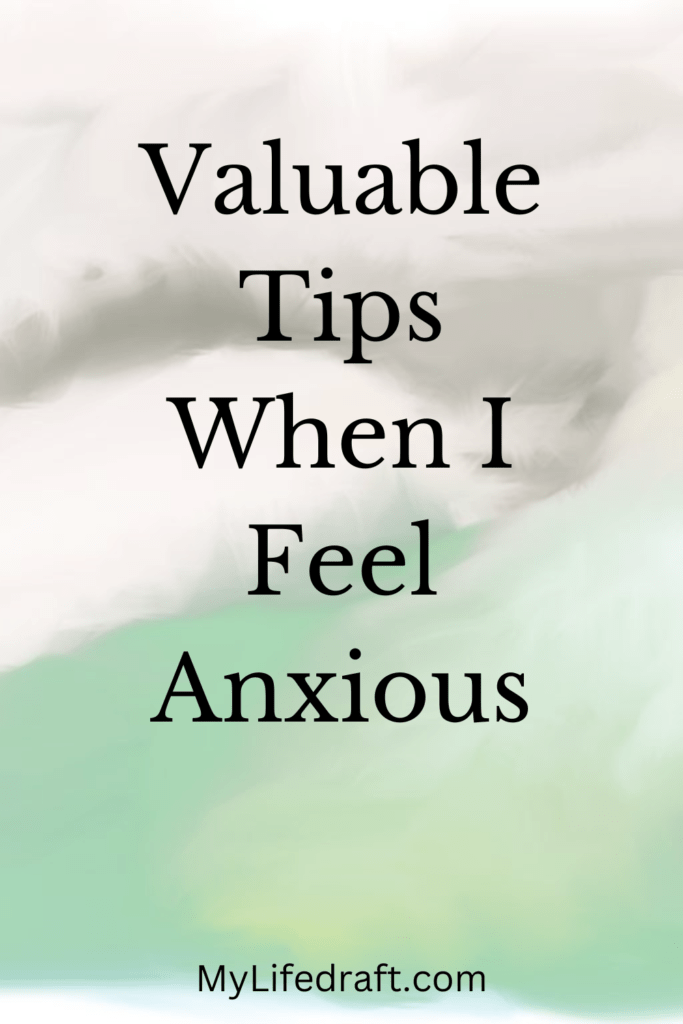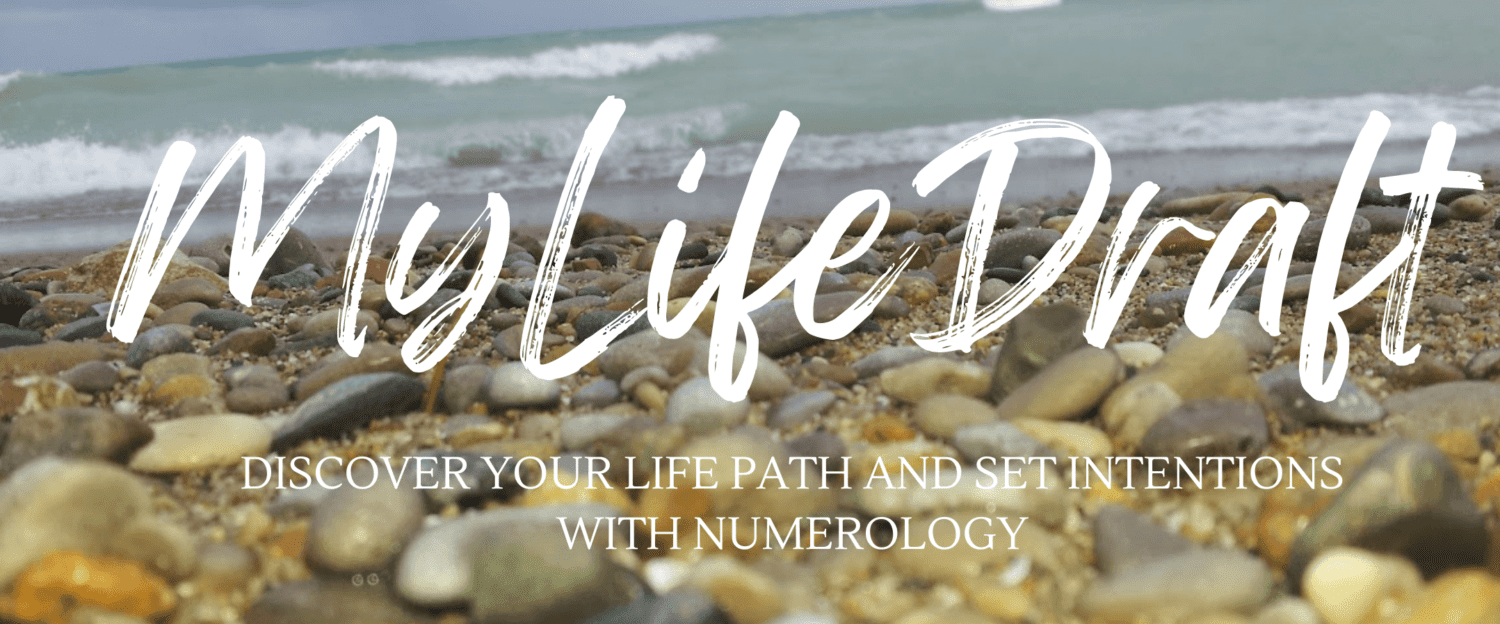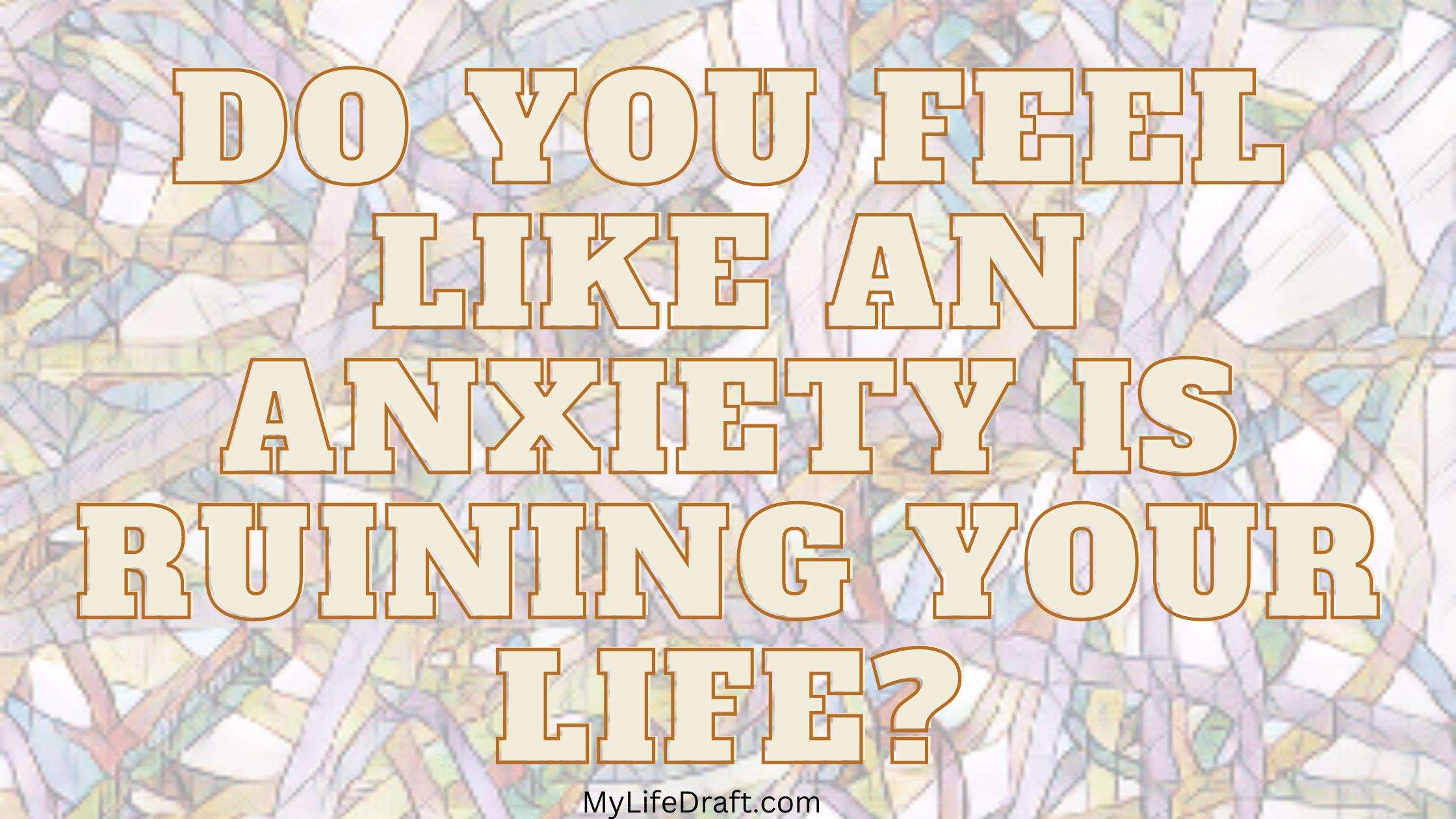Often, I felt anxious, but I didn’t worry about it until I had a panic attack. I always thought I was just one of those people that worried a lot. My worrying got so bad it started interfering with my life. Keep reading and discover Useful Tips When I Feel Anxious. In this article, I have 6 useful tips I used when I feel anxious.
Although some moments make me nervous and anxious, I discovered different coping methods. It is my hope if you suffer from anxiousness, these six simple ideas will help you. A Checklist so that when anxiousness strikes, you know exactly what actions will help bring back balance into your life.
When Anxiety Starts To Take Over

When the feelings of anxiousness are overwhelming and difficult to control, there is hope! With a few simple steps of self-care, you can reduce your worries and make it easier for yourself to find peace in moments of distress.
Not too long ago, I suffered from bouts of anxiety. And yes, I felt like it was taking over and ruining my life. It would come at the most inopportune time and take over my thoughts. Sometimes it would get so bad I felt like I couldn’t function. But I did push through it and kept going. Then one day, as if out of nowhere, a panic attack hit me like a tidal wave. Intense worry took over me, and every thought in my head was freaking out. My whole body was filled with anxiety overflowing throughout my body.
Valuable Tips That Help With Anxiety
Watch A Movie
Going to the movies is a great way to take your mind off all of your worries. You can escape from your troubles and focus on someone else’s story for a while. I like curling up and watching Netflix. Movie marathons every day isn’t recommended either, but rather as an occasional escape from reality. Sometimes the best thing to take care of yourself is the simplest thing.
Listen To Soothing Music
Listening to soothing music can be an effective way to reduce your anxiety. Find a track that relaxes you and listen to it while focusing on deep breathing or meditation. Music can help clear your mind and guide you to a more relaxed state. Pick something with a steady rhythm or calming sounds- like the ocean, birds chirping, and other nature sounds. Doing this for even 10 minutes a day can have positive results in decreasing your anxiety levels.
Establish A Healthy Sleep Routine.
Try to Get enough quality sleep. It is really important in managing anxiety. Creating a regular bedtime routine will help your body relax and help you fall asleep. Unwind before getting in bed by reading a good book, listening to music, or taking a warm bath. When you get closer to bedtime, turn off all screens and focus on deep breathing. When the next morning comes, you’ll be able to approach your day feeling refreshed, and you can better manage stress and ease anxious feelings.
Take A Bath Or Shower
Taking a bath or a shower can help wonders to take the anxiety away. A tub with a pleasant aroma or candles goes a long way toward helping you feel better. A bath will calm you when you are feeling anxious and uncomfortable.
Meditation
Meditating is a great way to help relieve anxiousness, which can be caused by numerous life events. Taking time each day to sit and clear your mind of worries and other stressors can help bring a sense of serenity and inner peace. It can allow negative thoughts to drift away and give you a chance to approach the situation more objectively. Meditation can also serve as a calming exercise prior to any major event or challenge, allowing individuals to feel more prepared than before and better able to conquer whatever task lies ahead.
Practice Deep Breathing Exercise
Taking a few minutes to focus on our breath can be incredibly beneficial. It’s an easy way to find inner peace and reconnect with ourselves. When we take the time for mindful breathing, we allow ourselves some well-deserved moments of stillness. Let your worries momentarily drift away as you inhale deeply and exhale slowly. This exercise works quickly, and you will notice how relaxed and refreshed you feel!
In order to reduce anxiety, taking a few deep breaths is a great way to start. Deep breathing exercises increase oxygen in the body, lower your heart rate, and help you relax by releasing tension. It’s important when doing this type of exercise to make sure that you are comfortable, whether sitting or lying down. With each breath, take time to inhale deeply through your nose and then exhale slowly through your mouth while counting both inhalation and exhalation. Over time you will begin to feel calmer as your body releases stress and resets itself.
Physical Activity.
Exercise can help you get out those feelings of nervousness. I prefer to go out for a jog or a good brisk walk. Physical activity is essential to help manage anxiety. Working out can give you an outlet for stress, and the improved physical health that comes with it provides your body with useful endorphins that can help lift your mood. The next time you find yourself overwhelmed and anxious, try going for a walk or jogging outside and breathing in some fresh air. This will help cleanse your mind and help relieve any tension or worries.
Additionally, make it a habit to dedicate a portion of your day to physical activity. Exercise picks up your happy endorphins and exercises your happy heart, from dancing and running to playing a sport or yoga. You could go to a yoga class or practice from home or in a peaceful place. Physical activity is an invaluable part of managing our anxiety levels, and it is important to remember that taking care of our mental health often means taking care of our physical health too!
Talk To A Friend Or Family Member
Talking to a close friend or family member about feelings of anxiety can be an invaluable step toward managing and understanding the issue. Even if it is difficult, having an understanding and caring person to talk to can make it easier for you to express your feelings. We all need someone that we can rely on when things feel overwhelming, and creating meaningful relationships encourages communication which helps us build a network of support for our mental health.
It may not be easy relieving the burden from your own heart and shoulders but sharing with someone else who will listen intently and offer practical advice means that together you have both taken part in improving your overall well-being.
Should I See A Doctor About My Panic Anxiety?
It is hard to be happy when your emotions are all over the place. This is when you need to get help. Mental Health is just as important as physical health, which we must take more seriously. Seeing your doctor and talking about your anxiety can’t hurt. I went to see a counsellor about how I felt, and she helped me a lot. A full-fledged panic attack is horrible, by the way, and can often feel like a heart attack. Your heart beats so fast, and you feel light-headed, so always get yourself checked by a physician.
Taking the next steps to look after your mental health can be a daunting task. Set up an appointment with your physician and discuss any emotional issues you may be facing, as they could provide valuable advice for how to move forward in life. If things seem too severe, however, don’t hesitate to reach out for help from emergency services right away.
I feel lucky to have a twin sister who is always there for me in times of stress. She is someone I can trust, talk through my anxieties with, and rely on as a source of strength. As someone who cares deeply about me, she offers her support and provides an ear or shoulder when needed. Overall, talking, even if it feels difficult, is highly recommended for mental health.
My anxiety, I knew, was the beginning of a complicated journey. Nevertheless, learning how to cope with these simple solutions helped me take steps towards managing my anxiety better and getting back to stability and inner peace.
Natural methods of relieving anxiousness, such as exercising, meditating, or deep breathing, are often significantly helpful. However, it is important to remember that they are not guaranteed to work for everyone. Anxiety is a complex and unique experience for each individual. Additionally, these methods may not always be enough to manage extreme symptoms of anxiety. If you are experiencing frequent or severe anxiety, it’s best to speak with a medical professional about other helpful treatments and interventions.
Whenever I’m feeling anxious, it helps to organize my thoughts by setting and intentions. To do this, Download an Intention Calendar. It’s a simple way to keep track of what activities I want to focus on and prioritize in the coming days. This could include anything from taking a walk each morning to meditating or spending time with loved ones, but it is tailored based on what you think will not only benefit your mental health at that moment but also move you towards accomplishing something in the long run. On a daily basis, my intention calendars help to ground me and make me feel less anxious.
If you have something to share, leave a comment.


